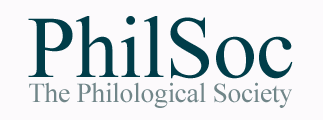This talk will be given at the University of Oxford, in Ertegun House.
Welcome to PhilSoc
The Philological Society (PhilSoc) was established in 1830 and is the oldest learned society in Great Britain devoted to the scholarly study of language and languages. As well as encouraging all aspects of the study of language, PhilSoc has a particular interest in historical and comparative linguistics, and in the structure, development, and varieties of Modern English.
Latest Recordings
From the PhilSoc Blog
The 27th International Conference of Historical Linguistics
Written by Fae Hicks (University of Edinburgh), recipient of a travel and fieldwork bursary from the Philological Society. Thanks to the support of PhilSoc’s Travel and Fieldwork bursary I was able to present my research, The myth of phonetic erosion: grammaticalisation, … Continue reading
Edinburgh Symposium in Historical Phonology
Written by Fae Hicks (Edinburgh) In the depths of Scottish winter, 1st – 2nd December, we welcomed over 50 Historical Phonologists to Edinburgh for the 7th Edinburgh Symposium in Historical Phonology (ESHP). ESHP is a biannual event that brings together … Continue reading
Edinburgh Symposium in Historical Phonology Master’s Bursary 2024-25
Written by Sophie Krol (UCL), a recipient of the Philological Society’s Master’s Bursary 2024-25 It is thanks to the Philological Society and their extremely generous Master’s bursary – and to my supervisors at Newcastle University who brought my attention to … Continue reading
Funding & Bursaries
Information about funding support available from PhilSoc may be found here

